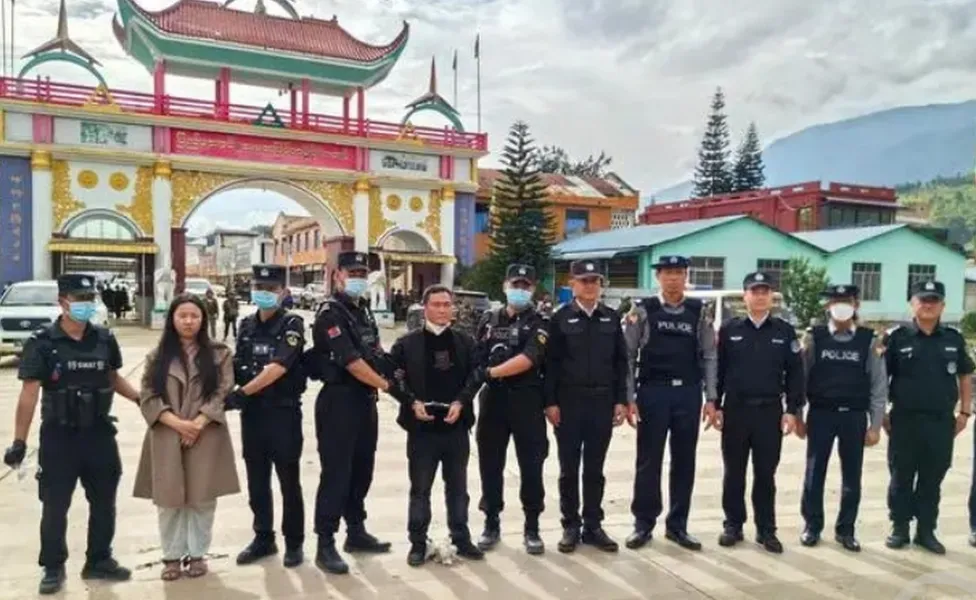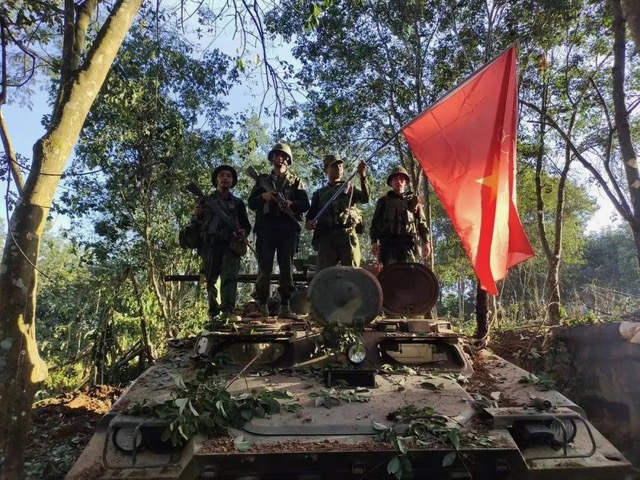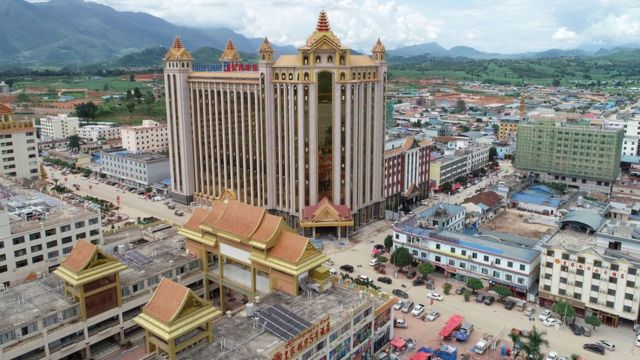Chinese police have shared photos of their officers with Chinese Mafia leaders handcuffed in front of a border checkpoint in northeastern Myanmar’s Shan State.
The two had just been turned over by Myanmar rebel fighters, the latest in a string of arrests of people accused of running scam centers in a hamlet near China’s northern border.
Ming Guoping and Ming Zhenzhen were the son and granddaughter of one of the great warlords who had ruled Laukkaing for the last 14 years.
The rapid intensification of the fighting in Myanmar has signaled the end of the Chinese mafia – the Godfather-esque “four families” – in this notoriously lawless border town.
Around the same time that Chinese police posted images of the arrested duo last Thursday, the official Myanmar military press published a photo of an alleged autopsy being performed on the body of a 69-year-old man in the back of a van.
The military claimed that the warlord himself, Ming Xuechang, committed suicide after being caught, an assertion that was met with skepticism by many.
Demise of Warlords in Myanmar
It was a disgraceful finish to an astonishing saga that began with war and revolution and evolved into one of drugs, gambling, greed, and Machiavellian competition. Ming Xuechang was a henchman for one of the families’ leader, Bai Suocheng.
Laukkaing, a rural, impoverished backwater, was converted into a boisterous casino hub of garish high-rise skyscrapers and sleazy red-light districts under them. After the demise of powerful warlords along the border, Myanmar handed over hundreds of suspects to China.
Although powerful, the Mings were not among the four families on this desired list, which included Wei Chaoren, Liu Guoxi, and Liu Zhengxiang.
Originally created to capitalize on Chinese appetite for gambling, which is prohibited in China and many other neighboring countries, Laukkaing’s casinos have morphed into a lucrative cover for money laundering, trafficking, and, most notably, dozens of fraud centers.
It is claimed that over 100,000 foreign citizens, many of whom were Chinese, were enticed to these scam centers, where they were effectively imprisoned and forced to work long hours running sophisticated online fraud operations targeting victims all over the world.
Crouching Tiger Villa, run by Ming Xuechang, was one of the most prominent of these scam centers. He also apparently ran the local police unit, which, despite wearing the standard Myanmar national police uniform, served as little more than a private militia, one of several that enforced the four families’ rule in Laukkaing.
As China increased pressure on all groups operating scam centers to shut them down and give over those who worked there, the Ming family refused. According to some estimates, each family’s casinos processed several billion dollars each year. Giving up was a massive business.
Chinese Workers Killed
The families also had close ties to the Myanmar military, and the Mings may have assumed they were safe, even from China’s demands, which has historically wielded considerable power in this border region.
A group of scam workers was being transferred from Crouching Tiger Villa in the early hours of October 20, most likely in anticipation of a Chinese police raid on the scam center.
When a number of workers, estimated to be between 50 and 100, attempted to flee, the fraud center guards opened fire, killing many. According to some reports, the dead included undercover Chinese police agents.
This triggered a strongly worded letter from the local government office in the neighboring Chinese province, as well as the issue of arrest warrants for four members of the Ming family by Chinese authorities.
China’s obvious anger with Myanmar’s ruling junta’s refusal or inability to rein in its friends in Laukkaing prompted three guerrilla armies calling themselves the Brotherhood Alliance to commence attacks against the military in late October.
In the past, China has always advised moderation in order to maintain calm along its border, but the necessity to sift out the well-funded and well-armed families in Laukkaing appears to have shifted its priorities. Laukkaing, originally an impoverished border village, has become a noisy center for gambling, narcotics, and scams.
Myanmar military campaign
The militants claim their purpose is to remove the fraud centers while also supporting the larger opposition fight to depose the military administration that took control in 2021. However, the fight in Laukkaing is more akin to vengeance, with roots dating back to the Cold War.
Min Aung Hlaing, the military leader who launched the 2021 coup and still leads the junta, was responsible for the four families’ control over Laukkaing. Min spearheaded a military campaign in 2009 to depose the then-dominant warlord in Laukkaing, an experienced warrior named Peng Jiasheng.
He intended to install partners who were more obedient to the interests of the then-military government, which was pressuring all of Myanmar’s ethnic insurgent groups to transform themselves into pro-government so-called border guard troops at the time.
Most, including Peng, declined, despite the military’s pledge to allow them to continue making money from illegal activities such as narcotics.
Peng was one of a group of Shan State warlords that developed during the instability of Myanmar’s post-independence years, when the central government’s control did not extend to most border districts.
Opium Production to Casino’s
Shan State’s only meaningful business was opium production, despite being desperately impoverished, distant, and barren. It grew to be the world’s largest producer, funding numerous insurgency factions.
Peng began as a commander in the China-backed Burmese Communist Party, but he mutinied in 1989 when Chinese assistance ceased, splintering the Burmese Communist Party into various armed insurgency factions.
The Myanmar military government was feeling vulnerable at the moment. It had just brutally suppressed a popular revolt in 1988, during which Aung San Suu Kyi first emerged as an opposition leader.
Concerned about a possible combination between the established ethnic rebel groups and the opposition movement, the generals moved fast to make peace with the insurgents, giving them complete control over their fiefdoms.
Peng began establishing Laukkaing as a gambling hub after being under pressure to reduce his narcotics business, which was fueling his operation.
When he refused the military’s proposal to convert his soldiers into border guards in 2009, Min Aung Hlaing encouraged Bai Suocheng, Peng’s deputy commander at the time, to revolt against him.
Peng was chased into China. Although gunshot holes littered the casinos, devoted gamblers continued to wager throughout the conflict. Bai and the other three families seized control of the gambling industry.










